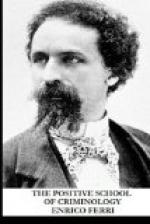Let this be enough so far as the anthropological factor of criminality is concerned. There are, furthermore, the telluric factors, that is to say, the physical environment in which we live and to which we pay no attention. It requires much philosophy, said Rousseau, to note the things with which we are in daily contact, because the habitual influence of a thing makes it more difficult to be aware of it. This applies also to the immediate influence of the physical conditions on human morality, notwithstanding the spiritualist prejudices which still weigh upon our daily lives. For instance, if it is claimed in the name of supernaturalism and psychism that a man is unhappy because he is vicious, it is equivalent to making a one-sided statement. For it is just as true to say that a man becomes vicious because he is unhappy. Want is the strongest poison for the human body and soul. It is the fountain head of all inhuman and antisocial feeling. Where want spreads out its wings, there the sentiments of love, of affection, of brotherhood, are impossible.
Take a look at the figures of the peasant in the far-off arid Campagna, the little government employee, the laborer, the little shop-keeper. When work is assured, when living is certain, though poor, then want, cruel want, is in the distance, and every good sentiment can germinate and develop in the human heart. The family then lives in a favorable environment, the parents agree, the children are affectionate. And when the laborer, a bronzed statue of humanity, returns from, his smoky shop and meets his white-haired mother, the embodiment of half a century of immaculate virtue and heroic sacrifices, then he can, tired, but assured of his daily bread, give room to feelings of affection, and he will cordially invite his mother to share his frugal meal. But let the same man, in the same environment, be haunted by the spectre of want and lack of employment, and you will see the moral atmosphere in his family changing as from day into night. There is no work, and the laborer comes home without any wages. The wife, who does not know how to feed the children, reproaches her husband with the suffering of his family. The man, having been turned away from the doors of ten offices, feels his dignity as an honest laborer assailed in the very bosom of his own family, because he has vainly asked society for honest employment. And




